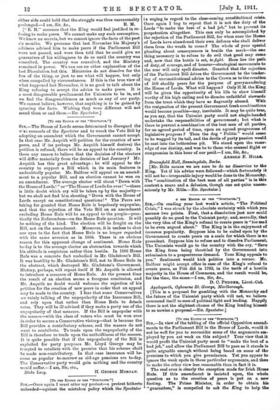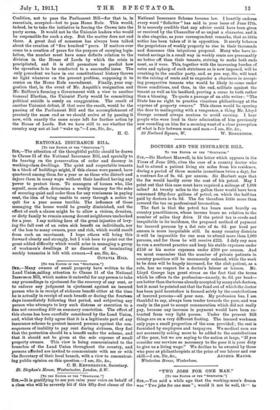(TO THY EDITOR 07 THZ "Erscraroa.") SIR,—In view of the
tabling of the official Opposition amend. merits to the Parliament Bill in the House of Lords, would it not be well for you to reconsider some of the arguments em- ployed by you ast week on this subject ? Your view that it would profit the Unionist party most to "make the best of a bad job," and allow the Parliament Bill to pass as it stands is quite arguable enough without being based on some of tie premises to which you give prominence. Yet you appear to ignore the weak spots in these particular arguments, and thus to make the other view less reasonable than in fact it is.
The real crux is clearly the exception made for Irish Home Rule. If this amendment is insisted upon, the whole question as to the creation of peers is put on a new footing. The Prime Minister, in order to obtain his "guarantees," is compelled to ask the Sing to help the Coalition, not to pass the Parliament Bill—for that is, in essentials, accepted—but to pass Home Rule. This would, indeed, be to take the initiative in forcing the Crown into the party arena. It would not be the Unionist leaders who would be responsible for such a step. But the matter does not end there. A great deal of nonsense has always been talked about the creation of "five hundred" peers. If matters ever come to a creation of peers for the purpose of carrying legis- lation, the number must have some definite relation to the division in the House of Lords by which the crisis is precipitated, and it is still premature to predict how the operation is to be conducted to a successful issue. The only precedent we have in our constitutional history throws no light whatever on the present problem, supposing it to centre on the Home Rule amendment. Finally, your sug- gestion that, in the event of Mr. Asquith's resignation and Mr. Balfour's forming a Government with a view to another General Election, the Unionist Party would be committing political suicide is surely an exaggeration. The result of another Unionist defeat, if that were the result, would be the passing of the Parliament Bill and the accomplishment of precisely the same end as we should arrive at by passing it now, with exactly the same scope left for further action by the House of Lords. But we have still to see whether the country may not at last "wake up."—I am, Sir, &c.,
H. C.















































 Previous page
Previous page